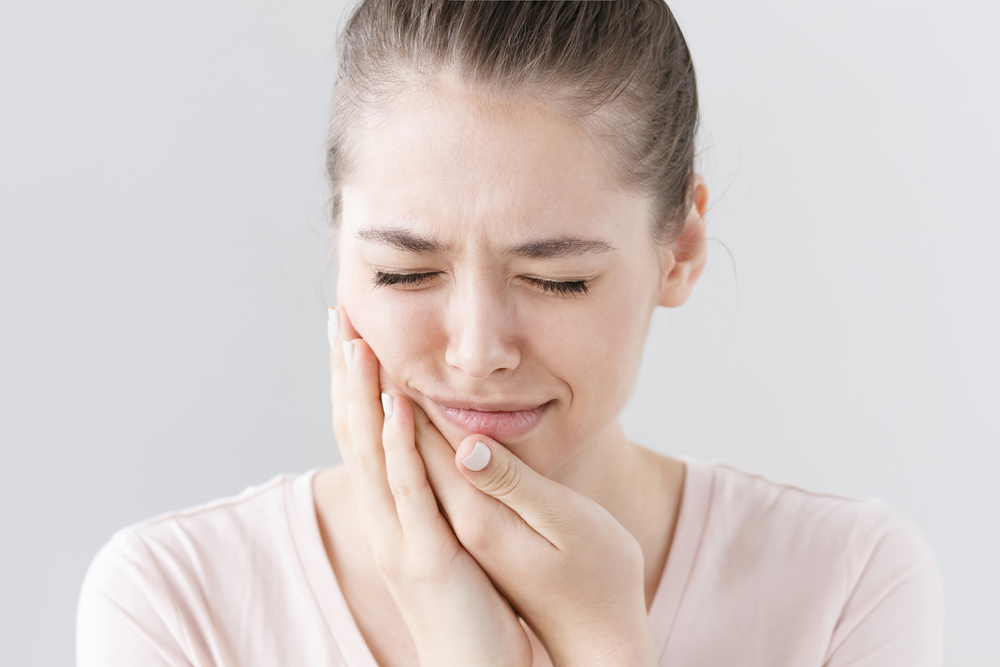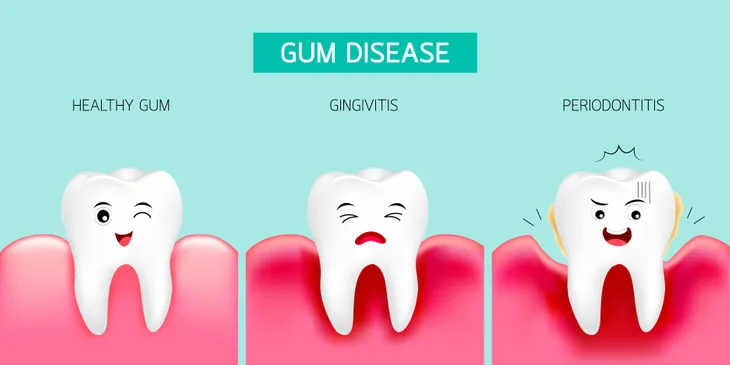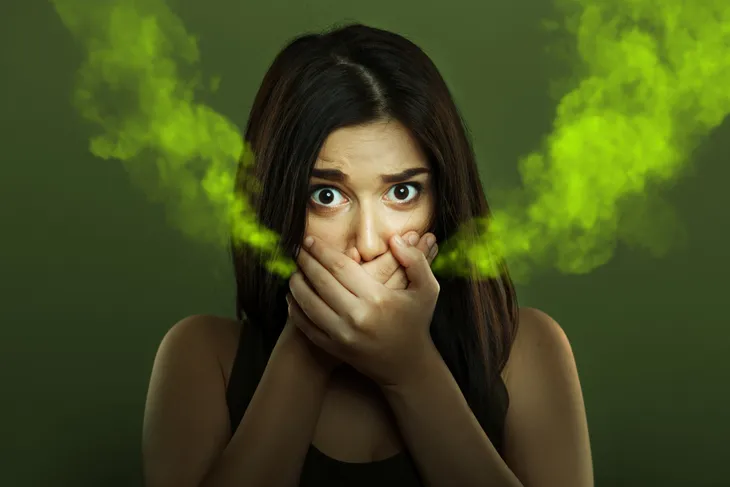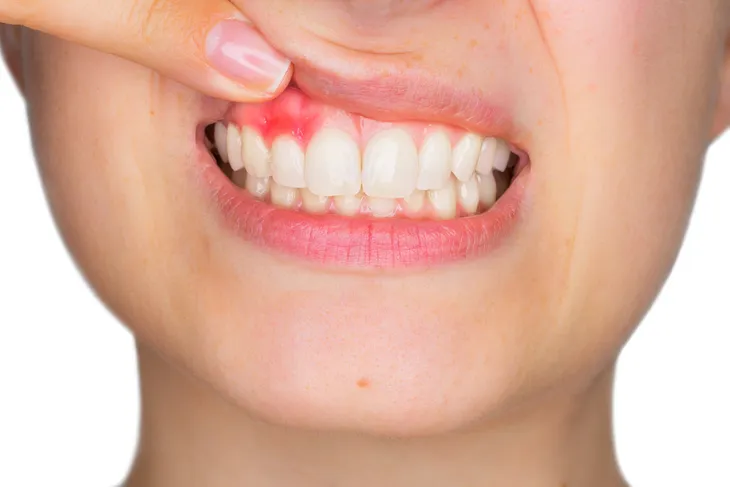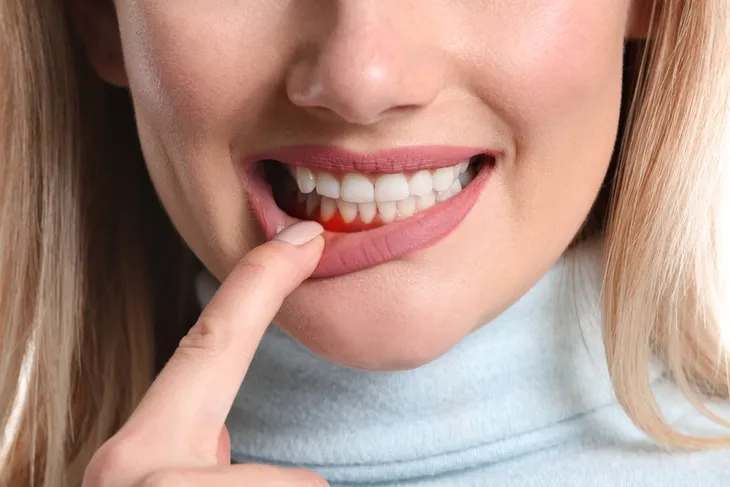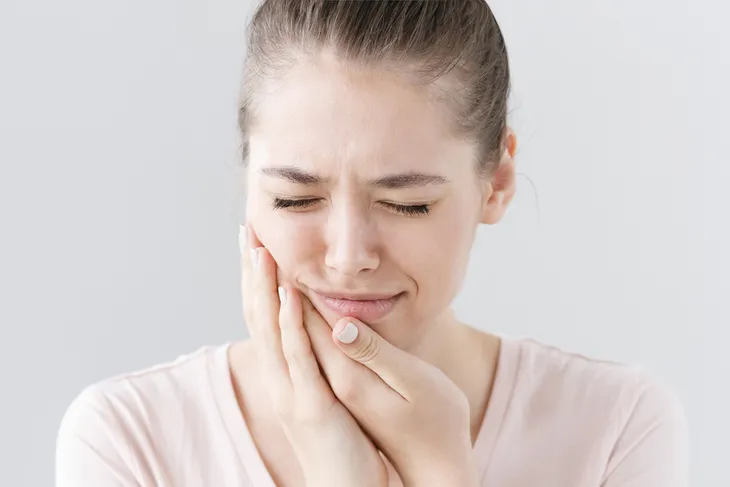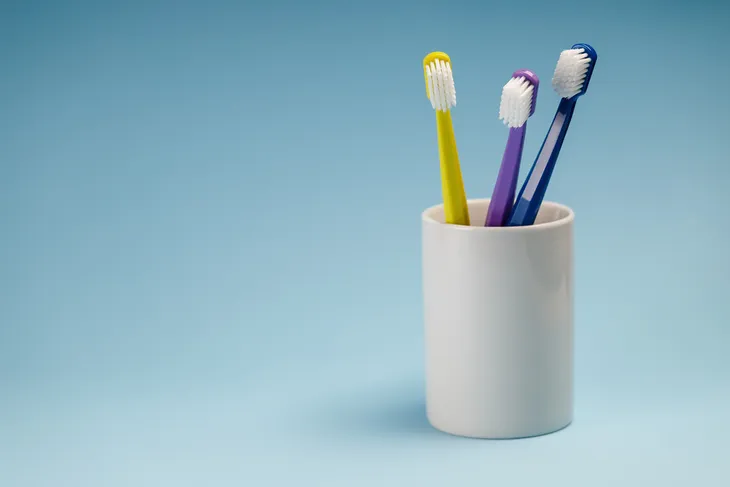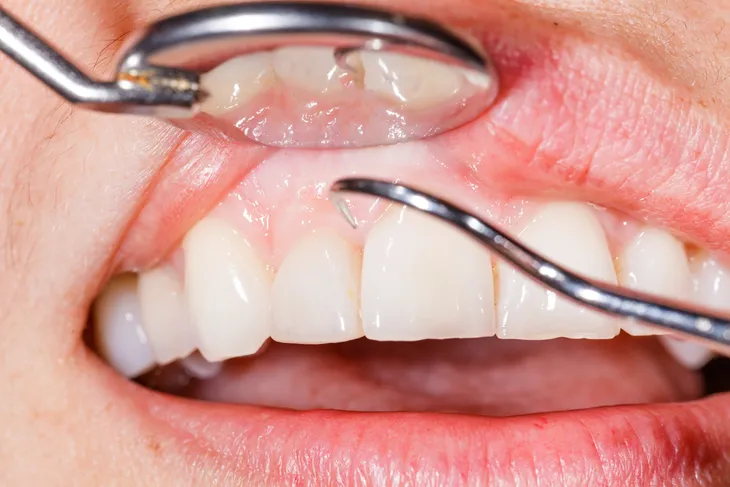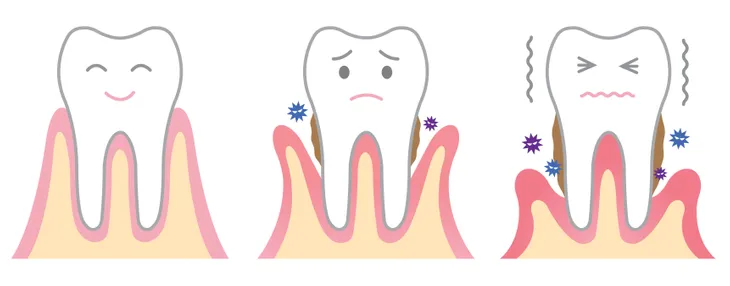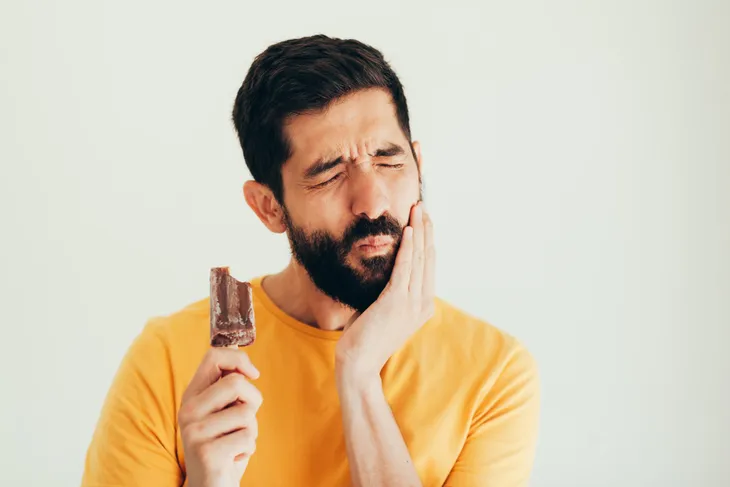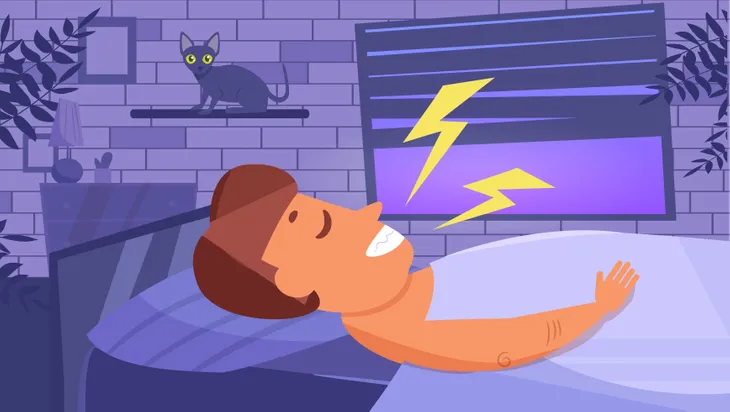When you spit out your toothpaste and notice that it turned pink — did you brush too hard or recently enjoy a Twizzler? According to the Mayo Clinic, gum disease (also known as Periodontal disease) is a serious gum infection that damages the soft tissue. If left untreated, it can have severe health consequences, and even lead to tooth loss.
To protect your oral health and maintain that pearly white smile, learn about the risks of gum disease and the important warning signs. Many of these signs could be easily mistaken for something else, so it’s important to be informed.
What Causes Gum Disease?
This disease impacts the soft tissues that hold your teeth in place. Without this “glue,” your teeth may become wobbly, and you could even lose them. Fortunately, the disease doesn’t progress from zero to dentures overnight. Before things reach a point of no return, your sulcus (or the spaces between your teeth), measure 3-millimeters or less and don’t bleed.
Gum disease results when the bacteria in your mouth flourish and destroy healthy tissue. Because of the many blood vessels in the area, it doesn’t take much for germs to enter your bloodstream. Once they invade your body, a gap in your grin may be the least of your worries.
What Are the Potential Complications of Gum Disease?
Gum disease can cause a range of adverse health effects if left untreated. People with gum disorders run a two to three times higher risk of a heart attack or stroke. The plaque on your teeth isn’t the same stuff lining your arteries, so what gives?
Scientists believe the key lies in inflammation. According to Dr. Hatice Hasturk of the Forsyth Institute, short-term inflammation tends to resolve itself. However, ongoing swelling increases the risk of atherosclerosis, or hardening of the arteries.
Heart disease isn’t the only potential complication of neglecting your gums. Researchers recently discovered a type of bacteria called Porphyromonas gingivalis (P. gingivalis) in Alzheimer’s disease patients’ brains. They theorize that it enters the bloodstream through the mouth, takes up residence upstairs and causes harm.
If you have rheumatoid arthritis, neglecting your teeth and gums could increase flare up frequency and symptom severity. Researchers from Johns Hopkins University found the same bacterium that causes chronic gum infection also inhabits the joints of those with the often-crippling movement disorder. Seeing your dentist regularly could decrease your pain.
Diabetic patients are more likely to develop periodontal disease. That’s because their condition makes them more susceptible to infection overall. However, considering that millions of Americans now struggle either with type 2 diabetes or a prediabetic state, more folks should attend regular dental checkups.
Now that you understand what causes periodontal disease and the associated health risks, what can you do to keep your mouth healthy? A wise place to start is by examining the following 12 signs — all that you could mistake for something else.
Warning Signs
Bad Breath
If you just hit your favorite Italian restaurant for a garlicky meal along with a bottle of wine, you might set off a few smoke alarms with your breath. You might not want to kiss anyone for a few hours, as these foods enter the bloodstream and travel to your lungs. As a result, each exhalation tastes suspiciously like bolognese sauce.
However, your mouth should produce adequate saliva to prevent bad breath between meals. If other people (hopefully in a kind matter) are continuously commenting on your bad breath, consider calling your dentist.
Swollen Gums
Did you just return from your annual dental exam? If so, you might feel more than a bit sore and swollen. If you aren’t in the habit of routine flossing, a thorough scrubbing can leave your gums slightly inflamed.
However, they shouldn’t feel puffy all the time. While only 30-percent of American adults floss daily, everyone should. If you can’t do so without discomfort, it’s time to call your dentist.
Discolored Gums
Some people naturally have darker gums than others. If you have an excess of melanin, a darkening pigment, these tissues might look nearly black without any underlying disease. Furthermore, some conditions, such as Addison’s disease and Peutz-Jeghers syndrome, cause darkened gums. Medications such as Minocycline can likewise cause discoloration.
However, if your mouth went from rose-colored to goth, you could have acute necrotizing ulcerative gingivitis, an advanced form of periodontal disease. You’ll probably feel lousy if you have this condition, and you must see a dentist for thorough cleaning — and perhaps antibiotics — to recover.
Mouth Sores
Various forms of mouth sores exist, and many have nothing to do with gum disease. Use caution and don’t do online research when you are eating a snack — the pictures will make you lose your appetite.
However, many such sores develop or worsen in the presence of excess oral bacteria. If your sores recur or increase in frequency or severity, it’s time to call the dentist. Even if periodontal disease isn’t the root cause, your practitioner may prescribe medications to bring you relief.
Spitting Blood
When you spit out your toothpaste after brushing, your sink should stay clear — or minty green or blue. While you want to do a thorough job, especially along the gum line, you shouldn’t brush so hard that you bleed. Still, that’s what many folks assume when they spy a pinkish tint.
Unless you bite your tongue, contact your dentist if you experience this symptom. You might otherwise feel fine, but a thorough cleaning can eliminate plaque buildup, leading to gum disease. Seek dental schools or community clinics that offer sliding-scale fees if you don’t have coverage.
Bleeding While Brushing
A more severe symptom includes bending over the sink to scrub and ending up looking like Count Dracula. Bleeding while you brush can indicate only two things — an open cut in your mouth or advanced gum disease.
When periodontitis — inflamed gums — reach this stage, you might find eating problematic. You don’t want everything you consume to taste vaguely copperish. See your dentist without delay. (For more information, here are 6 Ways to Brush Up on Oral Hygiene).
Longer Teeth
Have you heard the cliché, “getting a little long in the tooth?” It generally refers to folks who are advancing in age.
However, growing older doesn’t mean your choppers increase in size. Like mountains, they would erode with age. What happens is that your gums begin to recede, which can result in tooth loss if you leave the condition untreated.
Gaps Between Teeth
Before, you could barely wiggle a tiny thread of floss between them. Now, when you smile, you see a gap despite keeping all your pearlies.
Gaps often appear when your gums begin receding due to periodontal disease. While you should brush and floss your teeth daily, nothing substitutes for dental care. Dentists have instruments to remove the plaque that often develops along the gum line, which causes your gums to shrink.
Problems Chewing
Tooth problems can make you lose weight, albeit in an unhealthy way. As your gums become looser, you might find chewing more problematic. Gnawing a coarse piece of meat might result in tooth loss if your condition worsens.
If you can’t chew whole foods, you run the risk of malnutrition, even if you maintain sufficient caloric intake. Many of today’s processed offerings include white flour as a primary ingredient. During processing, manufacturers strip away vital magnesium and other nutrients your body needs to stay healthy.
Sensitivity to Heat and Cold
Does the thought of cold ice cream result in pain in the mouth? If you can’t enjoy a bowl of soup or frozen treat without significant discomfort, periodontal disease could be one cause.
Another reason for tooth sensitivity entails enamel worn down close to the root. Either way, you need to call the dentist to correct the situation. After all, no one wants to live without Ben & Jerry’s forever. (You might also want to check out this article on Foods That Can Harm Your Teeth).
Teeth Grinding
Periodontal disease can result in significant discomfort. You might feel pain even when you sleep — and start grinding your teeth to ease the throbbing. This unconscious behavior can result in broken teeth and an achy jaw.
Unfortunately, bruxism or teeth-grinding also results from chronic stress, something that many Americans experience. Try employing tension-taming techniques such as practicing yoga and meditation before you go to bed. If the condition improves or abates, you have no further worries. However, if the nightly grind continues, your symptoms will let you know to call the dentist.
Headaches
Gum disease can cause headaches. If you ever had a hangover so severe that you could feel it in your teeth, you understand the connection. The trigeminal nerve runs along the side of your head to your jawline, and when that bad boy gets triggered, misery results.
Furthermore, grinding your teeth at night or throughout the day can also trigger headaches. Since this symptom can result from many causes, you may wish to book an appointment with both your physician and dentist.
